Tarifa to Morocco Ferry: A Complete Travel Guide
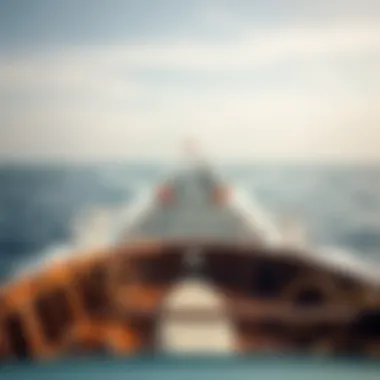
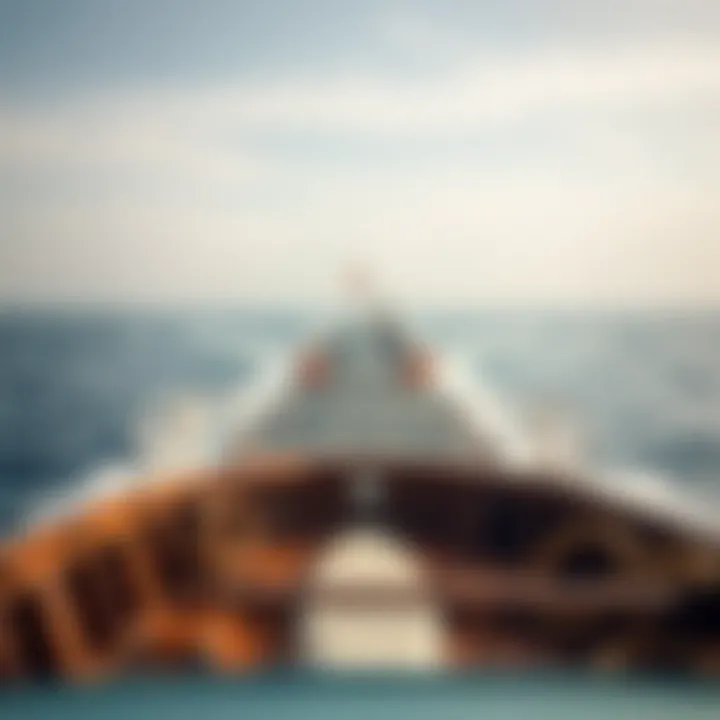
Intro
Embarking on the ferry from Tarifa to Morocco is not just a trip; it's an adventure that leads you across the historic Strait of Gibraltar. This journey opens up a world of discovery, where European influences blend seamlessly with North African culture. Whether you’re a surf enthusiast eager to ride the Moroccan waves or simply chasing a glimpse of a vibrant new landscape, this guide offers essential insights for your voyage.
Navigating the intricacies of ferry travel can be daunting. From understanding schedules to figuring out ticket prices, or knowing what to expect during the crossing, there’s a lot to unpack. But fear not, this comprehensive guide serves as your compass, ensuring you have all the key details at your fingertips.
As we explore the finer points of this ferry route, we’ll delve into essential aspects of the journey and highlight tips to enrich your experience. This isn’t just about reaching your destination; it’s about savoring every moment. So settle in, and let’s unearth everything you need to know about making the most of your Tarifa to Morocco ferry ride.
Understanding the Tarifa to Morocco Ferry Route
The journey from Tarifa, Spain to Morocco isn’t just a trip across the Strait of Gibraltar; it’s a significant crossing, laden with cultural exchanges, trade history, and bits of adventure. This route serves as a crucial link between Europe and Africa, and understanding it can greatly enhance your travel experience. Knowing how the ferry operates, its historical context, and its geographical significance will prepare you for a journey that is not just about getting from point A to B, but embracing the vibrancy of the surrounding cultures.
Recognizing the operational dynamics of these ferries allows travelers to take advantage of schedules, services, and onboard amenities that can otherwise be overlooked. The blend of geography and history contributes uniquely to the ferry ride, offering passengers reflections on how centuries of interaction has shaped both shores. Let's delve into these aspects for a clearer picture.
Geographical Significance
The Tarifa to Morocco ferry route spans approximately 14 kilometers across the Strait of Gibraltar, arguably one of the most historically and geographically important waterways in the world. It is in this narrow path that two continents collide, providing a channel for not just ferries, but also cultural currents that flow freely between Europe and Africa. The nearest point between Spain and Morocco, known as Punta de Tarifa, is a landscape of stark contrasts—rugged mountain peaks on one side and the golden beaches of North Africa on the other.
This crossing is not simply a practical means of travel; it presents a unique opportunity to observe the meeting point of different lands.
- Strait of Gibraltar: This strait has been a strategic military location and trade passage since time immemorial. Its deep waters and strong currents have long made maritime skills crucial for seafarers embarking on this journey.
- Natural Wonders: The area surrounding the strait is home to fascinating wildlife, including dolphins and migrating birds. On a good day, passengers may even catch a glimpse of these playful creatures during their voyage.
Thinking about the geographical significance enhances one’s appreciation for the journey. It elevates a simple ferry ride into an exploration of historical fortifications and natural beauty that has captured the imagination of travelers for centuries.
Historical Context
The history encapsulated in the ferry route from Tarifa to Morocco is rich and layered, echoing the tales of explorers, traders, and cultural exchange that defined this area. For many, this ferry journey is a modern undertone to ancient connections between Europe and Africa. Historically, Gibraltar was a pivotal link for trade routes and a launching point for several explorations.
- Colonial History: During the Age of Exploration, Spanish, Portuguese, and Moroccan interactions shaped the current relations. Tarifa itself has seen numerous battles and influences, leaving behind a legacy of conquests, treaties, and shared heritage.
- Cultural Exchange: The strait has long been a melting pot of cultures, where ideas, goods, and traditions crossed regularly. From spices to textiles, the line between these two lands has blurred through much of history.
This historical context provides depth beyond mere travel logistics. It offers passengers a sense of belonging to a larger narrative, where they can see themselves as part of an ongoing story that hasn’t concluded.
"Traveling isn’t just about the destination, it’s about the journey and understanding the paths walked before us."
In summary, comprehending the Tarifa to Morocco ferry route involves appreciating both its geographical and historical dimensions. These elements intertwine to enrich the ferry experience, transforming a simple crossing into a meaningful chapter in your journey.
Ferry Operators and Services
When it comes to embarking on your journey across the Strait of Gibraltar, the choice of ferry operators and services is paramount. Not only does it influence the ease and comfort of your trip, but it can also impact your wallet. Selecting the right ferry company ensures you receive a reliable service, thus enhancing the overall travel experience.
Major Ferry Companies
Among the many operators vying for travelers' attention, two main players dominate the Tarifa to Morocco ferry scene: FRS Iberia and Comanav. Each company brings its own unique offerings and character to the table.
- FRS Iberia: Recognized for its punctual and efficient service, FRS operates multiple daily crossings. The vessels are modern and well-equipped, making the roughly 35-minute passage feel like a breeze. Travelers often highlight the friendly staff and ease of booking through their website.
- Comanav: Not to be outdone, Comanav positions itself as a direct competitor with a fleet of ferries that caters to both tourists and locals alike. With slightly longer crossing times, the ambiance on board is often described as relaxed, making it a favorite for those looking to take a scenic approach. Several travelers have mentioned the spacious decks, which provide ample opportunity to soak in stunning views of the Moroccan coastline.
Each operator has its strengths, so it’s wise to compare schedules and customer reviews to find the service that best suits your needs.
Onboard Amenities
Once you're on board, the ferry experience can vary greatly between operators, and this is where amenities come into play. Comfort during your crossing can enhance your journey, particularly for surfboarders who might have special needs for gear storage. Here’s what you can expect:
- Seating Arrangements: Both companies typically offer a variety of seating options, from standard seats to more comfortable lounge areas where you can stretch out.
- Cafeteria Services: Hungry? Look no further. Most ferries include a cafeteria or snack bar that provides an array of food and refreshments. Whether you fancy a coffee to start your day or a hearty sandwich, you won’t go hungry.
- Deck Access: It’s hard to beat the view from the deck. During pleasant weather, you can step outside and enjoy the fresh sea breeze while looking out at the horizon. Keep your eyes peeled for dolphins; they often accompany ferries in this region!
- Wi-Fi Availability: If you need to stay connected, many ferries offer complimentary Wi-Fi. However, quality can be inconsistent and it may serve better to prepare for some time offline.
While choosing your ferry service, do keep in mind that onboard experiences can ride the tide of personal preference. A few more minutes of research into the specifics of each operator's offerings can lead to a significantly improved travel experience. However, visiting the operators' websites directly, such as
FRS Iberia and Comanav, can give you the most current information about amenities and services.
"Choosing a reliable ferry company is not just a convenience, it’s an investment in your travel experience."
Understanding the options available to you can help you craft a seamless transition from your point A to point B in this exciting cross-continental expedition.
Ferry Schedule and Frequency
The ferry schedule and frequency are vital components of your journey from Tarifa to Morocco. It dictates not just when you can make the crossing, but also how often ferries operate across this significant stretch of water. Understanding these aspects helps travelers like surfboarders and adventure seekers navigate their plans effectively and maximize their experience.
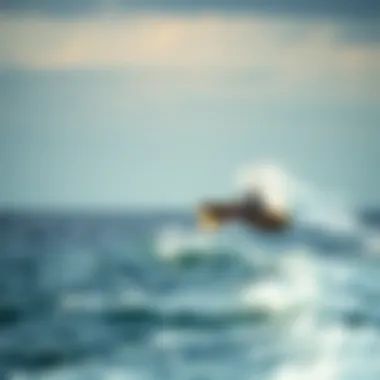
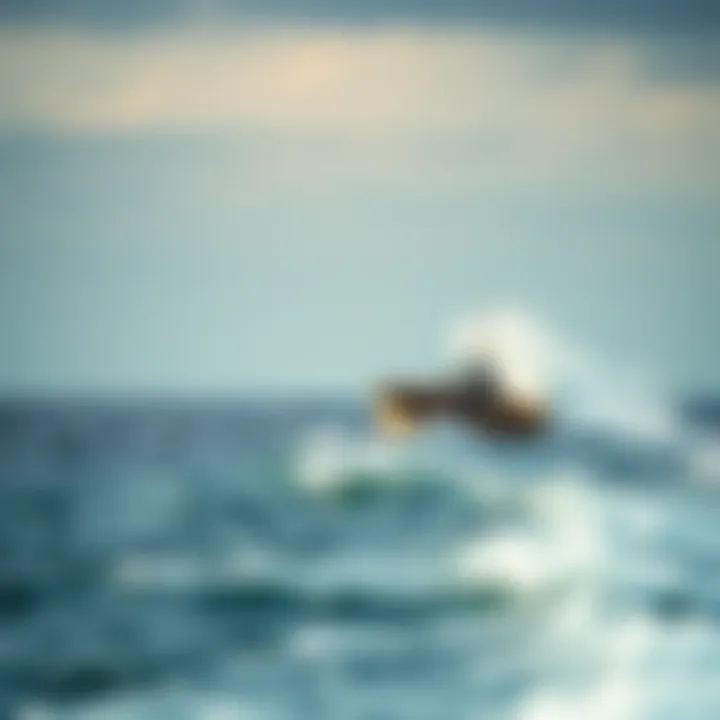
The ferry service operates year-round, though frequencies can fluctuate based on the seasons. During peak travel months, such as summer, expect a higher number of daily crossings. Conversely, in the colder months, departures may be sparser, presenting a distinct challenge for those who aim to catch the best waves without any hiccups.
Peak vs Off-Peak Travel
The choice between peak and off-peak travel can significantly impact both your travel experience and budget. Peak seasons, typically from late spring to early autumn, see an influx of tourists eager to soak up the sun and hit the waves. This leads to an increase in ferry traffic, with up to 10 trips a day, allowing for flexible travel plans. However, the downside is that prices tend to be at their highest during these months, and reservations can feel like trying to get your hands on gold dust.
On the flip side, off-peak travel comes with its benefits. The seas are likely to be less crowded, creating a more peaceful experience for boarding and disembarking. You might find that ticket prices are lower, and some ferry operators even roll out special discounts during this period. This approach is perfect for those willing to brave the chilly waters of early spring or late autumn.
Consider these insights before making your plans:
- Price Variation: Peak season means higher fares.
- Crowding Levels: Expect throngs of tourists in summer.
- Weather Considerations: Off-peak months can bring unpredictable conditions, so check forecasts.
Booking Tips for Best Rates
Securing the best rates for your ferry crossing isn't just about luck—it's about strategy. Here are some practical tips to help you snag the best deal:
- Book Early: Carve out some time to book your tickets at least a few weeks in advance. Early birds can snatch up cheaper tickets, especially for peak season travel.
- Use Official Websites: Platforms like Ferry.com often provide the most accurate and up-to-date pricing. Avoid third-party services unless you trust them, as they may charge extra fees.
- Watch for Promotions: Keep your eyes peeled for special promotions, especially around holidays or local events that celebrate surfboarding culture.
- Flexibility is Key: If possible, remain flexible with your travel dates. Sometimes, shifting your trip by just a day or two can lead to substantial savings.
- Consider Return Tickets: Booking a round trip can often yield a discount compared to purchasing two one-way tickets.
By paying attention to the ferry schedule and following these booking strategies, you can craft a seamless journey that skirts any common pitfalls and keeps your focus on the waves awaiting you in Morocco.
"Flexibility often leads to unexpected adventures and savings that can enhance your travel experience beyond expectation."
For further insights, including up-to-date schedules and prices, consider checking resources like Wikipedia or local travel forums on Reddit.
Ticket Pricing and Options
When planning your ferry journey from Tarifa to Morocco, understanding ticket pricing and options becomes crucial. This section aims to be your guiding light, shedding light on the various facets of pricing schemes available. The cost of a ferry ticket can directly impact not just your budgeting but also the overall experience and how smoothly your travel plans unfold.
A few significant points to consider:
- Offering Flexibility: Different ticket types can provide various levels of flexibility. For example, some tickets offer free changes or cancellations, allowing last-minute adjustments if your plans shift.
- Traveling Off-Peak: If you’re looking to save some cash, understanding peak and off-peak travel can help. Prices often fluctuate based on demand, and travelling midweek might get you a much better deal than over the weekend.
- Group Discounts: If you’re traveling with a crew of friends or are an adventure group, certain ferry operators might have group discounts or special rates for larger parties.
Standard Ticket Prices
Standard ticket prices for the Tarifa to Morocco ferry can vary based on several factors, such as the season, demand, and even the ferry operator. Typically, expect to pay around €35 to €65 for a one-way ticket. But, don’t just go on blind faith—these prices can shift like the tides.
A few key elements are worth noting:
- Class of Service: Most ferries offer different classes, from economy to business. The class you choose can dramatically impact what you pay. More comfort usually means spending a little more.
- Booking in Advance: Securing your tickets weeks ahead of time usually gives you an upper hand in getting a better deal. Some companies release advance ticket sales during low season when demand is lower.
Discounts and Promotions
Keep your eyes peeled for discounts and promotions, as they can significantly ease travel costs. Many ferry operators often roll out seasonal discounts or special offers that can aggregate savings, especially for travelers who manage to catch them in time.
- Check Online Platforms: Websites like ferrybooking.com or ferries.com frequently list current promotions and can help you compare prices.
- Membership Benefits: For frequent travelers, joining loyalty programs offered by ferry companies can bring worthwhile perks, including lower rates and exclusive offers. For example, travelers who often surf can find tailored options catering to surfing groups or enthusiasts.
"Don’t leave your budget to chance; a little research can go a long way in keeping your expenses in check."
By navigating the waters of ticket pricing and available options, you not only set the stage for a smooth trip but also boost your travel experience by aligning it with your budget. Be savvy, plan ahead, and keep those sails high!
Preparation for the Journey
Preparing for a journey from Tarifa to Morocco is not just about hopping on a ferry; it’s about ensuring a smooth transition as you cross from one continent to another. This preparation encompasses an array of essential considerations, particularly for travelers eager to delve into Morocco’s vibrant surf culture.
Understanding the nuances of travel preparations can significantly enhance the overall experience. When embarking on such a trip, the right travel documents and thoughtful packing can mean the difference between a carefree adventure and a hassle-filled journey. Let's dive deeper.
Essential Travel Documents
Navigating customs and immigration smoothly requires that you have the correct paperwork, ready to go at a moment's notice. Each traveler should carry the following documents:
- Passport: Ensure it’s valid for at least six months beyond your expected return date to Spain. A passport isn’t merely a stamp book; it’s your ticket into a new world.
- Visa: Most European citizens can enter Morocco without a visa for up to 90 days. However, double-check regulations based on your nationality via government resources like *.gov.
- Printed Tickets: While mobile confirmations are handy, having printed ferry tickets can help navigate any hiccups at the dock.
"Travel is like a good book; each page adds a new chapter filled with experiences. Don’t skip ahead by forgetting important details.”
- Insurance Documentation: It’s wise to have health and travel insurance in place. This ensures that in case of an emergency, you’re not left in the lurch.
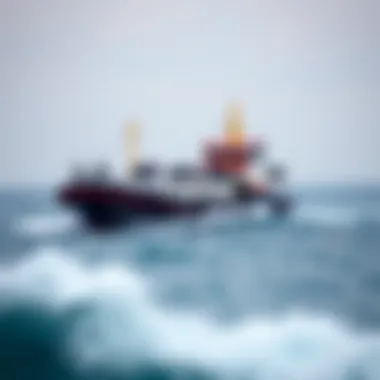
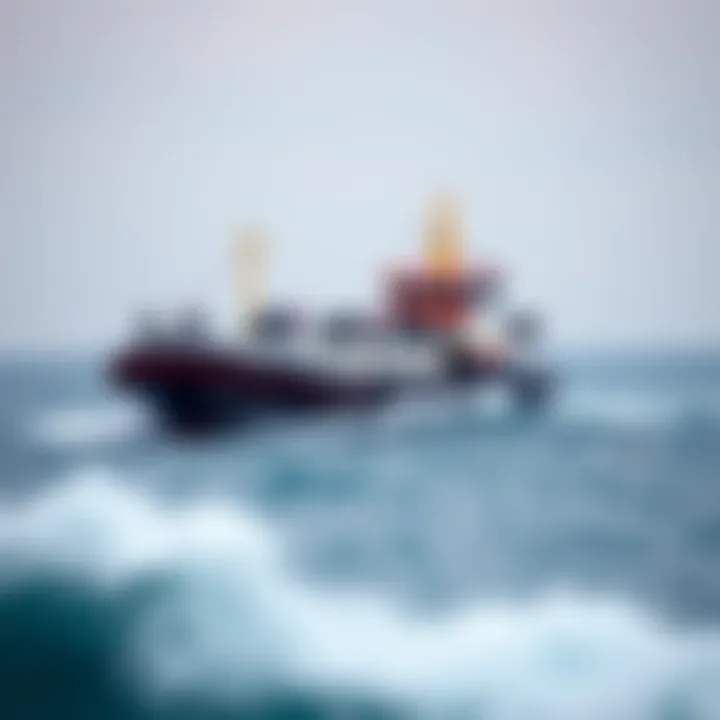
Having all these documents organized in a travel wallet not only saves time but also minimizes stress during the journey. It makes for a hassle-free embarkation and can certainly enhance the enjoyment of the ride.
Packing Considerations for Surfboarders
For surfboarders planning to seize Morocco's waves, the packing list diverges a bit from your standard tourist. Proper packing goes beyond just tossing in a few clothes; it’s about strategic preparation. Consider these points:
- Surfboard Gear: If you’re bringing your board, invest in a solid travel bag that offers protection against bumps and drops. Pay attention to the dimensions and ensure they align with airline policies regarding sporting equipment.
- Wetsuit: The waters can get a bit chilly, depending on the season. Pack a wetsuit compatible with the local water temperatures—around 18-22°C (64-72°F) during most months.
- Leash and Wax: Forgetting a leash can ruin a good session. Bring extras, along with surf wax suited to the temperature of the water.
- Beach Essentials: Sunscreen is a must, as well as a hat and perhaps a rash guard for sun protection while surfing.
- Casual Clothes: Comfortable clothing for downtime is essential, particularly when exploring local markets or enjoying a sunset after a long day of catching waves.
Think of your packing as a setup for adventure—gets you geared up for what lies ahead. Ensuring you have all necessary items not only saves you frantic shopping in Morocco but also allows you to focus on having fun.
In a nutshell, preparation significantly impacts your travel experience—having your essential travel documents in check and packing meticulously for your surf adventures contributes to a joyful and memorable journey. This lays a solid foundation as you prepare for the enchanting expedition across the Strait of Gibraltar.
Ensuring that you set off with the right tools and information in hand sets the stage for an unforgettable venture into Morocco.
The Ferry Experience
The voyage from Tarifa to Morocco is a unique adventure that extends beyond mere transportation. It embodies the transition between two worlds, intertwining elements of culture, natural beauty, and the thrill of the open sea. For travelers, particularly surfboarders eager to ride the Moroccan waves, this journey lays the foundation for the experiences that await. Thus, understanding the ferry experience is crucial for anyone planning to traverse this strait.
From the moment you step onto the ferry, a mix of excitement and anticipation runs high. It's not just about getting from Point A to Point B; it’s about immersing yourself in a situation that feels distinctly different from the everyday hustle. The salty breeze, the sound of waves crashing against the hull, and the distant silhouette of Africa on the horizon set the tone for what lies ahead.
Benefits of the Ferry Experience
- Scenic Views: Crossing the Strait of Gibraltar provides breathtaking panoramas. Whether you’re staring out at the famed rock of Gibraltar or watching dolphins play in the wake, the natural beauty is captivating.
- Cultural Prelude: This short voyage serves as an introduction to Moroccan culture. You might hear snippets of Arabic and Berber, smell fragrant tajines wafting from the ship's galley, or see travelers adorned in vibrant shawls.
- Community Atmosphere: Ferries often bring together diverse groups of people. You'll find fellow surfboarders, families, and locals, all sharing in this brief adventure together.
Overall, understanding this experience sets the stage for a fulfilling trip filled with local insights and newfound connections as you make your way into Morocco.
Embarking and Disembarking Process
When it comes to embarking and disembarking, a well-organized process helps maintain an efficient flow of travelers and vehicles. Starting at the Tarifa terminal, be prepared for a buzzing environment. The line for boarding might look daunting, but it usually moves more quickly than anticipated.
- Check-in: Arriving an hour before departure is advisable. Validate your ticket at the service desk, where the staff provides essential information about your boarding time and location. Having your passport handy is crucial here, as it's required for international travel.
- Boarding: You will likely board the ferry by foot or drive your vehicle onto the ship. Be attentive to the staff's directions, as they’ll direct you where to park or walk. If you're traveling with your surfboard, ensure it’s secured appropriately to avoid any damage during the short journey.
- Disembarking: Upon arrival in Morocco, expect a similar process but with added customs checks. Once the ferry docks, remain seated until the crew gives the all-clear. When your turn comes, follow the crew's directives; it helps to keep things running smoothly and avoids unnecessary congestion.
Navigating Onboard
Once aboard, the ferry is equipped to make your crossing comfortable. Let’s break down some key areas you might want to focus on:
- Seating Areas: The lounges offer spacious seating and large windows, perfect for enjoying those stunning views. Claiming your spot near the front can enhance your experience, as the best sights unfold right in front as you approach Morocco.
- Onboard Amenities: Like many modern ferries, you'll find cafes and kiosks serving snacks and drinks. Grab a quick bite or que a coffee to keep your energy up as you set sail.
- Entertainment Options: Depending on the ferry, there may be entertainment options available. Some offer movies or even games for passengers, making the hour-long journey feel much shorter.
"The ferry is more than just transit; it’s a vessel of unity between two cultures."
By navigating the onboard experience with a bit of awareness, you'll find that the trip not only builds excitement for what’s to come but also allows for some pre-adventure relaxation.
Arriving in Morocco
Arriving in Morocco marks the beginning of a thrilling adventure for travelers. This first step off the ferry can feel both exciting and a touch overwhelming. For surfboarders and other adventure seekers, understanding the unique aspects of stepping into a different land is crucial. This section provides insights about what to expect when you disembark and how to ensure a smooth transition.
Customs and Immigration
Crossing the Strait of Gibraltar is a breeze for most travelers, yet it requires a bit of preparation, especially regarding customs and immigration procedures. Upon arriving, travelers must present their passport at the port of entry, which could be Tangier or Ceuta, depending on your ferry choice.
Here's a friendly reminder: keep your travel documents handy, as you will also need to fill out a declaration form if you're bringing in goods over the limit. It's worth checking the latest customs regulations on government portals such as gov.uk or local Moroccan sites before you travel. Generally speaking, carry-on items like surfboards might require additional checks, but don't let that deter you. Just be sure to inform the officers if you have gear that might need special handling.
"Preparation is key. Know the customs regulations to avoid any bumps along the way."
The immigration process is typically straightforward. There's often a dedicated lane for tourists, which speeds things up. The friendly Moroccan authorities appreciate a respectful demeanor. Make sure to greet in Arabic or French; a simple "Salam" or "Bonjour" can go a long way in forging a positive interaction. Keep in mind that high season can lead to longer wait times, so a pinch of patience can equal a much smoother entry.
Connecting to Further Destinations
Once you’re in Morocco, the opportunities for exploration are vast. The excitement doesn't end with customs—it merely ramps up. A well-established transport network connects key locations across the country, making it a lot simpler to navigate your next destination.
Consider potentiaL routes straight from the ferry terminal:
- Buses: A reliable option for budget travelers. Buses frequently run from Tangier to cities like Marrakech, Agadir, or Essaouira. Companies like CTM offer comfortable rides at a decent price point.
- Taxis: For those looking for convenience, taxis are plentiful, but negotiating a fare beforehand can save you a headache. It's advisable to opt for a grand taxi for longer distances.
- Car Rentals: If you prefer independence, renting a car opens up your agenda. Ensure you have an international driving permit if you're planning to drive around.
Make sure to plan ahead regarding your initial destination. Locations like Agadir are surfer favorites with stunning beaches, while cities like Marrakech offer a taste of Moroccan culture and heritage. No matter where your journey leads, each stop is a chapter not to miss.
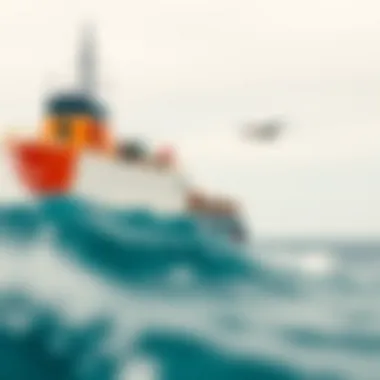
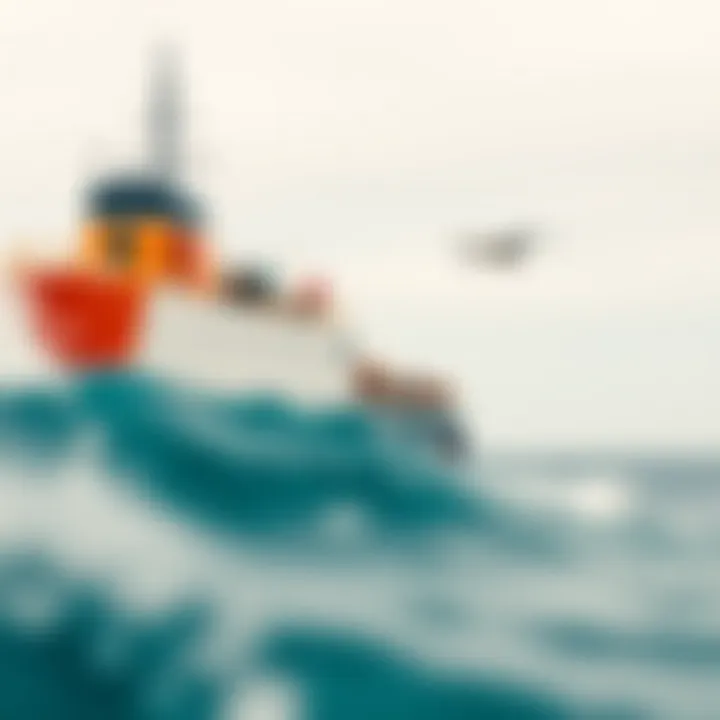
Transform the moment you arrive and let Morocco sweep you into an enchanting adventure.
Exploring Moroccan Surf Culture
Understanding the vibrant surf culture of Morocco is essential, especially for those traveling from Tarifa. The proximity of Morocco to Europe makes it a feasible destination for surfboarders from all over the continent. The unique geographical features and diverse coastline of Morocco not only provide ideal surfing conditions, but they also immerse travelers in a rich cultural tapestry that enhances the overall experience. From the warm hospitality of locals to the delicious Berber cuisine, engaging with the local surf community offers numerous benefits. Surfing in Morocco allows individuals to connect with the ocean, learn new skills, and appreciate a different way of life.
Popular Surf Spots in Morocco
Morocco has emerged as a beloved destination for surfboarders, boasting a variety of renowned surf spots that cater to various skill levels. Some of the most notable locations include:
- Taghazout: A small fishing village that has transformed into a surging hub for surfers from all walks of life. Waves in this region are consistent, offering both beginners and experienced surfers ample opportunity to catch the swell.
- Essaouira: Known for its stunning windswept beaches, this coastal town is great when the north winds blow. The conditions here can challenge even the most seasoned surfers.
- Imsouane: Home to one of the longest rideable waves in the world, Imsouane offers surfers the chance to glide across a wave for extended periods, making it a paradise for those seeking that perfect ride.
- Sidi Kaouki: Less crowded than its neighbors, Sidi Kaouki is the perfect spot for those looking to escape the hustle and bustle while enjoying great surf.
Whether you are eyeing a tranquil sunset session or looking to face the crashing waves with fellow surfers, these spots hold an undeniable charm. Their varied environments also come with unique local flavors you won’t want to miss.
Surfboarding Schools and Lessons
For those just starting or wishing to refine their skills, Morocco has a plethora of surf schools that offer lessons tailored to all levels of expertise. This is an integral aspect of the local surf culture. Notable schools include:
- Surf Maroc: Offering comprehensive lessons, this school combines world-class instruction with surf camps that integrate Moroccan culture into your learning experience.
- Gokool Surf School: Here, instructors not only teach surfing but also emphasize environmental consciousness and respect for the ocean, making the learning process holistic.
- Wave & Dance School: This school introduces a unique approach by incorporating yoga and dance into surf training. A fantastic way to enhance both physical and mental skills!
Lessons can range from beginner-friendly to advanced techniques, ensuring everyone finds a suitable program. Engaging with local surfboarding schools provides a solid foundation for newcomers and enriches the overall cultural experience.
Embracing the local surf culture in Morocco does not solely involve catching waves; it embodies a lifestyle that respects nature and fosters camaraderie among surfers.
In essence, embracing the Moroccan surf culture is about more than just the thrill of surfing. It’s a deeper dive into a world where sport meets tradition, offering a myriad of experiences just waiting to be discovered.
Local Customs and Practices
Understanding local customs and practices is essential for anyone traveling to Morocco, particularly those making the ferry journey from Tarifa to experience the unique culture of this North African gem. Those colorful traditions and shared social norms not only enrich your travel experience but also demonstrate respect for the people and their way of life. Morocco offers vibrant landscapes, rich heritage, and diverse communities, making it vital for visitors to grasp key cultural nuances. Not knowing these customs can sometimes lead to misunderstandings or faux pas, which can put a damper on an otherwise splendid adventure.
Cultural Etiquette for Travelers
When visiting Morocco, adopting the local etiquette can go a long way. Here are several practices that travelers should keep in mind:
- Greetings: A friendly handshake often kicks off a conversation. It’s common for men to shake hands with one another, while a slight nod or a smile suffices between men and women. When greeting, using the Arabic phrase "Salam Alaikum" (Peace be upon you) can be an endearing way to connect.
- Dress Code: Modesty is valued, especially in rural areas. Opt for loose-fitting clothing that covers shoulders and knees. For women, adding a scarf can be welcomed in more conservative settings.
- Dining Practices: Meals are typically communal. Expect to be invited to share food, so it’s advisable to bring your appetite and perhaps a small gift, like dates or sweets, when dining at someone's home.
- Photography: People are usually amiable towards photography, but it’s polite to ask for permission first, particularly in rural areas.
By adhering to these customs, you’ll foster positive interactions, creating an atmosphere of respect and warmth.
Cuisine and Local Delicacies
No visit to Morocco is complete without indulging in its diverse and flavorful cuisine. Each dish tells a story, often influenced by the region's history, climate, and cultural amalgamation. Here’s a look at some delightful treats:
- Tagine: This quintessential Moroccan dish is usually slow-cooked in a clay pot. Variants include chicken with preserved lemons and olives or lamb with prunes and almonds. It's an art form in itself, bursting with rich flavors.
- Couscous: Often reserved for Friday family gatherings, couscous is made from steamed semolina and topped with vegetables and meat. The fluffy texture and subtle taste make it a staple food.
- Mint Tea: Known as "Moroccan whiskey," this refreshing beverage symbolizes hospitality. Served with plenty of sugar, you should enjoy it in small glasses, often accompanied by pastries.
- Street Food: Don't shy away from the vibrant food stalls found in markets. Items like grilled skewers of meat or spicy harira soup are must-tries and provide an authentic taste of the local culture.
"The heart of Morocco beats in its markets, where the aromas of spices fill the air and the laughter of merchants welcomes you."
By partaking in these culinary delights, you not only satiate your hunger but also engage with the local culture, creating memories that will linger long after your visit. To sum up, embracing local customs and savoring Moroccan cuisine adds depth to your journey, making your transition from Spain to Africa not just a trip across waters, but a dive into a rich and enchanting mosaic of experiences.
For more insights into Moroccan culture, consider visiting Britannica or the Moroccan National Tourist Office.
Fostering knowledge of these cultural intricacies will not only enhance your traveling experience but also allow you to appreciate the beauty of a culture that is as warm and inviting as its people.
Safety Considerations
When embarking on a ferry journey across the Strait of Gibraltar, it’s essential to keep safety at the forefront of your travel plans. This section dives into the vital elements of safety considerations to help ensure a smooth and secure transition from Tarifa to Morocco.
Health and Safety Guidelines
Prioritizing health and safety during travel shouldn’t be taken lightly. Here are key guidelines to follow:
- Stay Informed About Health Risks: Before setting off, it’s wise to check for any health advisories related to both Spain and Morocco. Websites like CDC.gov or WHO.int often have updated information regarding vaccines or alerts.
- Personal Hygiene: Maintaining high standards of hygiene can significantly reduce the risk of illnesses. Carry hand sanitizers, and ensure you wash your hands regularly, especially before eating.
- Travel Insurance: Invest in travel insurance that covers medical emergencies. This can save you from unexpected expenses related to health issues while traveling abroad.
- Emergency Contacts: Have a list of emergency contacts in both languages, Spanish and Arabic. Familiarize yourself with local emergency numbers. In Morocco, for instance, the police can be reached at 19 and medical emergencies at 15.
- Stay Hydrated and Well-Nourished: Ferries often provide food and drinks; however, it's prudent to carry some personal snacks and enough water. Dehydration can spoil the fun, particularly on a busy travel day.
Transportation Options Upon Arrival
Upon disembarking from the ferry in Morocco, understanding your transport options is crucial. Options vary from local taxis to bus services, and getting familiar with these can ease your transition.
- Local Taxis: Taxis are plentiful at the port. They can be a quick and convenient choice, but agree on a fare before getting in to avoid surprises.
- Shared Taxis (Grand Taxis): These are a popular and affordable way to travel between cities. They can fit a number of passengers, so they often wait until full. A good option if you’re traveling on a budget.
- Public Buses: For those prepared to navigate local transport, buses can take you to various parts of Morocco. They tend to be slower but are cost-effective and provide a glimpse into daily Moroccan life.
- Ride-Sharing Apps: Despite being less common than in other parts of the world, apps like Uber are available in some cities. This can be a modern alternative if you prefer to handle transportation via your smartphone.
- Car Rentals: If your plans include exploring more remote areas or surfing spots, considering a rental car could provide flexibility. Make sure to familiarize yourself with local driving laws and conditions.
Important: Always stay aware of your surroundings, keep your belongings secure, and use reputable transport services. Safety in numbers helps too, especially when navigating new places.
By understanding health and safety guidelines, as well as your options for getting from A to B upon arrival, you can ensure that your trip from Tarifa to Morocco is not just exciting but also safe and manageable.















